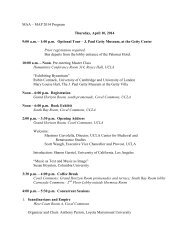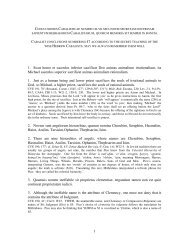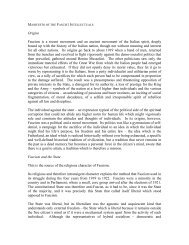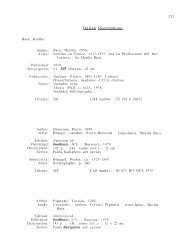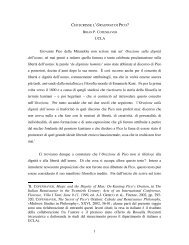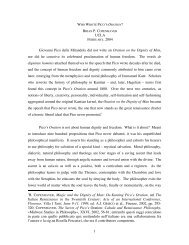1 (1) Pythagoras of Samos instructed the region of Italy once called ...
1 (1) Pythagoras of Samos instructed the region of Italy once called ...
1 (1) Pythagoras of Samos instructed the region of Italy once called ...
You also want an ePaper? Increase the reach of your titles
YUMPU automatically turns print PDFs into web optimized ePapers that Google loves.
2 THE MEANING OF THE SIX TERMS CALLED ‘TRANSCENDENTALS,’ AND PROOF<br />
THAT ‘THING’ HAS FIRST PLACE AMONG THEM, WHILE THE REST ARE NOT<br />
TRANSCENDENTAL.<br />
(1) First <strong>of</strong> all, it is intrinsically obvious that <strong>the</strong>re should not be several emperors or<br />
kings but only one, as Homer’s Ulysses says:<br />
To be many-mastered is no good: let <strong>the</strong>re be one master<br />
And one king given by <strong>the</strong> son <strong>of</strong> Kronos, crooked in counsel. 28<br />
Therefore let us ask which <strong>of</strong> <strong>the</strong>se is <strong>the</strong> term, or what is <strong>the</strong> meaning <strong>of</strong> <strong>the</strong> term, which<br />
is emperor and king <strong>of</strong> <strong>the</strong>m all – which meaning can contain more than any – as God,<br />
<strong>the</strong> Son <strong>of</strong> God, gave it to us. (2) Given a choice, I suppose <strong>the</strong> Peripatetics would<br />
bestow this honor on <strong>the</strong> term <strong>the</strong>y nominate first, for <strong>the</strong>y are always talking about it, as<br />
if it were a piece in a game <strong>of</strong> dice for <strong>the</strong>m to play with and use its many sides. 29<br />
According to me, however, <strong>of</strong> <strong>the</strong> six terms that now seem to be claiming <strong>the</strong> kingdom,<br />
none will be king except ‘thing,’ just as Darius, son <strong>of</strong> Hystaspes, was <strong>the</strong> only one who<br />
would become king out <strong>of</strong> <strong>the</strong> six Persians who rose up to seek <strong>the</strong> kingdom. 30<br />
(3) While ‘being’ is <strong>the</strong> one among <strong>the</strong>m that presents <strong>the</strong> strongest appearance <strong>of</strong><br />
securing <strong>the</strong> kingdom, <strong>the</strong> hidden defect that it suffers from is <strong>the</strong> greatest. While<br />
describing this term at greater length, let me speak very briefly about <strong>the</strong> o<strong>the</strong>rs since<br />
inquiry leaves no doubt about <strong>the</strong>m. Does ‘something’ not mean ‘some thing’? Does<br />
‘one’ not mean ‘one thing’; ‘true’ a ‘true thing’ or a ‘truth,’ which is also a thing; ‘good’<br />
a ‘good thing’ or ‘goodness’ or ‘righteousness,’ which itself is a thing as well?<br />
Accordingly, ‘being’ means ‘that thing which is.’ (4) In order to show this more<br />
explicitly, I shall argue precisely and carefully.<br />
By its nature, ‘being’ is a participle <strong>of</strong> any gender, but when it becomes a noun it is<br />
neuter only. In Greek, however, it is variable, with three words for three genders – ôn,<br />
ousa, on – and when <strong>the</strong> neuter word becomes a noun it takes <strong>the</strong> article to, which is not<br />
applied to <strong>the</strong> participle, and this is <strong>the</strong> ‘being’ that Aristotle talks about. (5) But its<br />
meaning will be clear from its participle. Every participle has <strong>the</strong> force <strong>of</strong> a relative<br />
pronoun with a verb: a ‘person walking, running or reading,’ for example, is someone<br />
‘who walks, who runs, who reads,’ as a ‘person being rich’ is someone ‘who is rich.’<br />
Although all <strong>the</strong> Greeks use this participle with great frequency, hardly any <strong>of</strong> <strong>the</strong> Latins<br />
used or uses it, (6) as Priscian confirms, saying: “The Greeks use <strong>the</strong> participle as a<br />
substantive, which by analogy we can use also, except that frequent employment <strong>of</strong> <strong>the</strong><br />
28<br />
Hom. Il. 2.204-5.<br />
29<br />
The term is ‘being’ (ens); Zippel cites Arist. Meta. 2.7; Peter <strong>of</strong> Spain, Summulae 2.2; Paul <strong>of</strong> Venice,<br />
Liber metaphysicus 1.<br />
30<br />
Darius became king <strong>of</strong> Persia in 522 BCE, but he was actually <strong>the</strong> last <strong>of</strong> seven conspirators, according to<br />
Herodotus (3.68-79); Valla, who was <strong>the</strong> first to translate Herodotus into Latin, continues this analogy,<br />
where Darius as king corresponds to ‘thing’ (res) as <strong>the</strong> real ruler among <strong>the</strong> six trancendentals.<br />
8<br />
2/21/05 9:35 PM 8/44



